- Home
- Tom Stoppard
Plays 5 Page 18
Plays 5 Read online
Page 18
The first act – after the prologue – starts just before sunset, the last rays illuminating the garden; twilight follows quickly on this, and darkness has overtaken the play by the time of Ruth’s second entrance.
Night and Day was first performed at the Phoenix Theatre, London, on 8 November 1978. The cast was as follows:
George Guthrie William Marlowe
Francis George Harris
Ruth Carson Diana Rigg
Alastair Carson Jon Bentley
Dick Wagner John Thaw
Jacob Milne Peter Machin
Geoffrey Carson David Langton
President Mageeba Olu Jacobs
Directed by Peter Wood
Decor Carl Toms
Lighting Robert Bryan
Presented by Michael Codron
Act One
African sunset.
An open, empty stage, the frame perhaps broken by the branch of a tree. There may be a low skyline but not necessarily. The ‘cyc’ looks very beautiful. The sun is nearly down. The sky goes through rapid changes towards darkness.
A distant helicopter is heard approaching. By the time it reaches ‘overhead’, darkness has fallen and there is moonlight.
Helicopter very loud. Shadow of blades whirling on the floor of the stage. Violent shaking of foliage. A spotlight from the helicopter traverses the stage. It disappears. A jeep drives on to the stage with its headlights on. Not much can be seen in the darkness. Two or three people in the jeep. Guthrie is one of the passengers. The jeep turns into the audience so one can only see headlights.
By the time the jeep appears, a machine-gun has started up. The noise is all very loud – helicopter and machine-gun. The jeep probably isn’t audible. Someone – Guthrie – shouts something about the lights, and the jeep’s headlights are turned off. The jeep hasn’t stopped moving. It is turning in a circle. The spotlight comes back and sweeps across the jeep. Guthrie jumps out of the jeep and runs. He doesn’t leave the stage. He just runs out of the light. The light loses the jeep. The jeep goes. Guthrie crouches in a down-stage corner. He is shouting but it is hard to catch. He is shouting ‘Press! Press! You stupid fuckers!’ Then the spotlight finds him. He stands up into the light with his arms spread out, shouting. The gun is firing bursts. He moves away from the corner. A burst catches him and knocks him over.
A late afternoon light reveals Guthrie stretched out on a long garden chair. Sundown. The steps to the verandah and the room are behind him. The telex is visible and chattering in bursts like the machine-gun; it is apparent that the noise of the telex had entered Guthrie’s dream in the form of machine-gun fire. This noise has continued right through the transition of the scene. This sound is joined by the sound of an approaching car. The telex stops. Not far from Guthrie’s chair is his camera-bag, with pockets for cameras, lenses, exposed and unexposed film, and other small objects. An empty glass is lying near the chair.
Guthrie is apparently asleep. Francis enters and removes the empty glass and goes again. The car arrives. The car door slams. Ruth enters carrying two or three packages which she puts down. She comes into the room expecting to find somebody there (Guthrie’s car is outside) and then she sees him on the chair in the garden. She comes down and looks at him curiously. Guthrie doesn’t move. Ruth notices the bag and bends down and touches it, perhaps to peer inside it.
Guthrie Please don’t touch that.
Ruth I’m sorry.
Guthrie Christ. That wasn’t nice at all.
Ruth I thought you were asleep.
Guthrie I thought I was dead.
He has barely moved and now doesn’t move at all. Ruth looks at him.
Ruth Are you all right now? (Pause.) That’s good.
(Pause.) I don’t think we’ve met.
Guthrie half sits up, then relapses.
Guthrie Uh? Sorry, do you want to sit down?
Ruth (drily) Thank you.
She moves up the steps to the small table on the verandah and sits down. Guthrie seems to be coming to. He sits up slightly.
You shouldn’t sleep in the sun.
Guthrie squints up at the sky.
Guthrie It moved.
Ruth It does that. It’s called night and day.
Guthrie relapses again. Francis comes on with a tea-tray, a nice tea-set with one cup and saucer. He brings this to Ruth’s table, while –
‘Ruth’ I think you’re going to like it.
(Sings) ‘Night and day … you are the one.’
With her right hand she plays imaginary piano keys on the table. We hear the piano.
‘Only you beneath the moon and under the –’
A wrong note, caused by Francis placing the cup in the saucer. He has put the tray on the table in front of Ruth.
Ruth Thank you, Francis. Has the house been opened to the public?
Francis What’s that, Mrs Carson?
This gets through to Guthrie.
Guthrie Oh – God – I’m terribly sorry –
Ruth I shouldn’t get up; you look awful. (to Francis who is leaving) Another cup.
Ruth’s manner is easy-going. Guthrie gets up.
Guthrie No – I’m fine. Sleeping on planes – you know. Ruins the complexion. From the inside. (He has come up the steps towards Ruth.) My name’s Guthrie – George Guthrie.
Ruth How do you do? I’m Ruth Carson. Would you care for some tea?
Guthrie Wouldn’t say no.
Ruth is pouring tea for Guthrie into the only cup.
Ruth Do you take sugar?
Guthrie No thank you.
Guthrie goes back down the steps to his bag and fishes about in it. Meanwhile Francis comes in with another cup.
Ruth (to Francis) Thank you. Would you take those parcels, Francis?
Guthrie is looking for something – saccharin tablets – in his bag. Francis leaves with the packages.
I’m sorry I wasn’t here to greet you Mr … Guthrie. I had to go into Jeddu to pick up some things.
Guthrie The boy said it was OK to wait in the garden. Is that all right?
Ruth Of course. But I’m afraid I have no idea what time Geoffrey will be home. He’s been in Malakuangazi – I was expecting him this afternoon.
Guthrie I’ve come to meet Dick Wagner.
The name has the English form – Wag-ner. He has found the saccharin and is coming back to the table. Ruth remains perfectly still. Guthrie comes casually back to the table and sits down. Ruth waits until he looks at her.
Ruth What are you talking about, Mr Guthrie?
Guthrie Dick Wagner. Do you know him?
Pause.
Ruth Is he a composer?
Guthrie No. He’s a reporter. Writes for the Sunday Globe, in London. I take the pictures. The pictures, as you know, are worth a thousand words. In the case of Wagner, two thousand. He was supposed to be at KC to meet me.
Ruth Why in God’s name do you expect to meet him at my house?
Guthrie He told me. He left a message at the airport.
Ruth He told you to meet him at my house?
Guthrie, sipping tea, catches her tone for the first time, and hesitates.
Guthrie Well, he didn’t mention you.
Pause.
Ruth What kind of camera do you use?
Guthrie Do you know anything about cameras?
Ruth No. (Pause.) By the way, we don’t call them boy any more. The idea is, if we don’t call them boy they won’t chop us with their machetes. (brief smile) Small point.
Guthrie holds his arm out, palm to the ground.
Guthrie Boy about this high, fair hair, your mouth, knows about cameras, has a Kodak himself; said I could wait in the garden.
Ruth acknowledges her mistake, but Guthrie pushes it.
His name’s Alastair.
He has pushed it too far and she snaps at him.
Ruth I know his bloody name.
Guthrie (olive branch) The one I use mainly is a motorized F2 Nikon. (sips tea) Lovely.
R
uth (smiles) Would you like a proper drink?
Guthrie (relaxes; shakes his head) The sambo gave me a lime squash. (winces) Sorry. (His hand chops the air twice.) Chop-chop.
Ruth gets up; moves.
Ruth Why is my husband filling my house with journalists?
Guthrie I thought he was one.
Ruth Geoffrey? Don’t be silly.
Guthrie I saw the telex.
Ruth That’s for his business. Did he ask this man to come here?
Guthrie I don’t know.
Ruth What does he want?
Guthrie I don’t know.
‘Ruth’ Help!
Piano chord.
Guthrie A story maybe.
‘Ruth’ I need somebody – help –
Piano chord: it’s the Beatles’ song, ‘Help!’.
Guthrie What is his business?
‘Ruth’ (picking up the rhythm) Not just anybody – He-e-e-lp!
Car approaching.
Guthrie Somebody coming.
Guthrie stands up and moves back into the garden looking out. Piano cuts out.
‘Ruth’ You’re a reasonable looking sort of chap, Guthrie. How would you like to take me away from all this? (new voice) My God, Ruth, not a journalist!
Ruth laughs briefly at herself.
Guthrie (reporting from the garden) Beat-up Mercedes. Is that your husband?
Ruth It’s a taxi.
Guthrie (looking out) Wagner.
Ruth leaves. She goes into the house.
Helicopter approaching fast and low. Guthrie, in the garden, looks up surprised. He sees the helicopter apparently coming straight at him. He cowers and goes into a crouch, his hands over his head. Shadow whips across the garden. Then the helicopter has gone.
Alastair has entered. He sees Guthrie crouched.
Alastair What’s the matter? Mr Guthrie?
Guthrie Hello.
Alastair is carrying an old-fashioned leather-bound Kodak. The camera is folded and Alastair holds it by the strap. Guthrie straightens up.
Hello.
Alastair I’ve found it. Are you going to show me about it?
The receding helicopter noise has been succeeded by the taxi stopping outside the house. A dog barks, but not for long. Obscure voices of Wagner and Francis. Taxi departing.
Guthrie I think my friend has arrived.
Alastair I came before but you were asleep.
Guthrie I’m sorry.
Alastair Will you show me later?
Guthrie Sure.
Alastair I believe this is an excellent camera. It just needs some film.
Guthrie When does your daddy get home usually?
Alastair That was him. The helicopter.
Guthrie Oh.
Another car drives away from the house.
Alastair He buzzes us. Then Francis takes the car down to the compound to fetch him.
Guthrie The compound?
Alastair The mine. It’s not daddy’s own helicopter. He’s just allowed to use it. A helicopter is extremely useful in a country like Africa. Have you ever flown in one?
Guthrie Yes, a few times.
Alastair In Africa?
Guthrie No, in Asia.
Alastair Well, you know how useful they can be.
Guthrie Yes. This is my friend, Dick Wagner.
Wagner has entered.
Wagner (enthusiastically) Hello Gigi, you lovely bastard! (He moves down into the room and slaps Guthrie’s shoulder.) You look terrific!
Guthrie I look terrible.
Wagner (fresh start; same tone) You look terrible! How are you? House is wide open. Is Carson here?
Guthrie This is Alastair Carson.
Wagner (talking down) How do you do, Alastair? And how old are you?
Alastair Eight. How old are you?
Wagner Kid’s a natural.
Female voice off, not Ruth, ‘Allie!’
Alastair Got to have my bath now, anyway. (to Guthrie) Would you like to look at my camera ’til I get back?
Guthrie Sure.
Alastair You won’t forget?
Guthrie No.
Alastair I’ll come back. (He goes.)
Guthrie How are things here, Dick?
Wagner Not wonderful. Bloody thing won’t catch fire. Where’s this Carson?
Guthrie He’s on his way. Who is he?
Wagner He runs the business end of the copper industry. Also manganese, potash … he’s in mines generally.
Guthrie But not frequently.
Wagner How about Mrs Carson?
Guthrie She keeps herself nice, too.
Wagner Where is she?
Guthrie Inside somewhere. Are you a friend of the family?
Wagner Hardly. The one who came out here was an earl or something. Grandfather, I think. There’s an elder brother defending the title in England. This one works for a living. As it were. She’s his second wife.
Guthrie What are we doing here?
Wagner Looking up Carson.
Guthrie Why?
Wagner I don’t know. I think Hammaker must know him. (He takes a folded cablegram out of his pocket.) I got this on Sunday. ‘Guthrie arriving KC ex-Dacca Thursday. ETA ten hundred. Suggest uplook Geoffrey Carson at home Jeddu. Happy birthday. Hammaker.’
Guthrie takes the cable out of his hand.
How’s Dacca?
Guthrie You know Dacca. It’s not Paris.
Wagner (nods; sings badly) ‘April in Dacca … I love Dacca in the springtime. I love Dacca in the …’ Yeah. It’s not Paris. It’s Dacca.
Guthrie (handing back the cable) Is it your birthday?
Wagner No. Sounds good, doesn’t it?
Guthrie Did you clock the telex?
Wagner looks round and sees the telex.
Wagner Christ!
Guthrie (nods) Happy birthday.
Wagner I don’t believe it.
Guthrie Do you think he’s got a wire machine somewhere?
Wagner We’re going to make them sick.
Guthrie Who’s out here?
Wagner Everybody.
Wagner has gone to the machine. He taps a couple of keys and waits for the evidence that it is in working order. The machine chatters back at him briefly. Wagner looks at Guthrie wide-eyed.
We are going to make them ill.
Guthrie Doesn’t the hotel have telex?
Wagner The hotel doesn’t have cleft sticks. There’s a post office in town which is a joke. Fritz Biedermeier said when he blew the dust off the counter there was an urgent message for Stanley from the New York Herald.
Guthrie That wasn’t here, was it?
Wagner It was a joke.
Guthrie OK. Who’s Biedermeier?
Wagner Newsweek. He was in Beirut that time.
Guthrie Oh yeah. Him. Has he got a photographer?
Wagner No, he’s got a Pentax.
Guthrie That’s bad for trade.
Wagner Yeah, I wouldn’t like it if you learned to write. I think we’ll do OK. Especially now we’ve got wheels. Which is yours?
Guthrie The Cortina.
Wagner Good. The taxi drivers have started to hire themselves out by auction.
Guthrie How did you get up from Kamba City, then?
Wagner In a Cessna.
Guthrie Bloody firemen.
Wagner Afraid of missing the war. It wasn’t so expensive – I shared with a couple of photographers.
Guthrie (interested) Yeah? – who’s that?
Wagner One was a Frog – Jean-Paul something. Belmondo, maybe. St Laurent army fatigues and a gold chain, very tough with the Gauloises, no filters – know what I mean? ‘I was a Left Bank layabout ’til I discovered photo-journalism.’
Guthrie (sharply, angrily) Knock it off will you, Dick? (Pause. Apologetically) He’s really very good.
Wagner Sorry.
Guthrie What about the other one?
Wagner A groupie. No sweat. He had one of those cameras with a little picture of a cloud and a little
picture of the sun and you slide it across according to the weather.
Guthrie (smiles) Well, I’m shooting Tri-X through two thousand quid’s worth of lenses, but he’ll get better pictures if he’s in a better place. One time in Hué I was in a dug-out with Larry Barnes, and this American kid is there – he looked like a hippie, bummed his way into the country and got himself a letter from AP and a second-hand Leica, so he’s accredited, right? – wouldn’t know his arse from a hole in the ground except he’s in a hole in the ground, and he’s lost his light meter. He’s reading his Kodak packet, and there’s all kinds of shit coming over, mortars, and he says to Larry, ‘Hey, do you think this is cloudy-bright or semi-dull?’ Well, you can’t see any sun because of the smoke, so Larry says, ‘I think it’s cloudy-bright.’ This kid then starts walking forward behind a tank and the next time I see him he’s got a set of prints of VC attacking the bridge, it looked like Robert Mitchum was just out of frame. Three pages in Match.
Wagner Maybe it’s the same kid.
Guthrie Later he stepped on a land-mine.
Wagner (pause) It probably isn’t, then.
Guthrie And Larry. And the other three in Larry’s helicopter. Do you know how many people were killed in that war?
Wagner Not exactly.
Guthrie Fifty-four.
Wagner Oh. People.
Guthrie And eighteen missing.
Wagner Don’t be morbid, Gigi.
Guthrie I’m not being morbid. (Pause.) Before you came I was sleeping, just over there, and I dreamed that I bought it – got killed by a helicopter. I was really quite spooked.
Wagner You were dreaming about Larry.
Guthrie No – not in a helicopter crash – we were in a jeep, and this gunship was shooting at us. And then it killed me. Is this going to be a helicopter war?

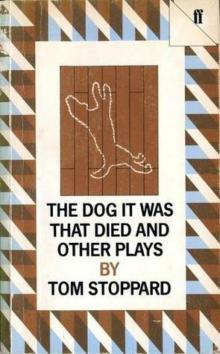 The Dog It Was That Died and Other Plays
The Dog It Was That Died and Other Plays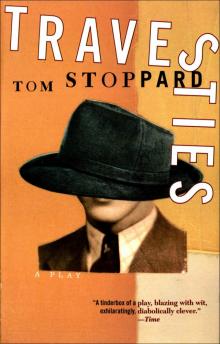 Travesties
Travesties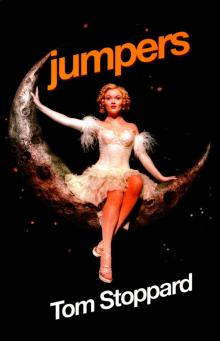 Jumpers
Jumpers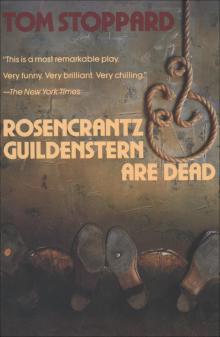 Rosencrantz and Guildenstern Are Dead
Rosencrantz and Guildenstern Are Dead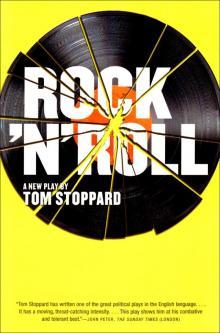 Rock 'N' Roll
Rock 'N' Roll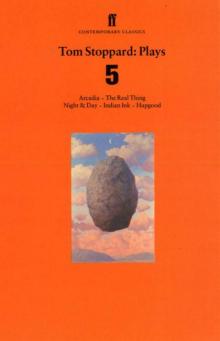 Plays 5
Plays 5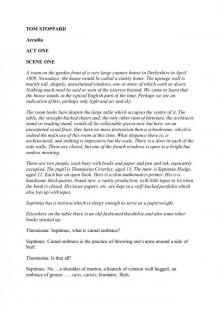 Arcadia
Arcadia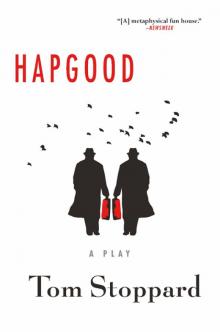 Hapgood
Hapgood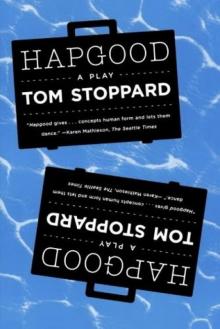 Hapgood: A Play
Hapgood: A Play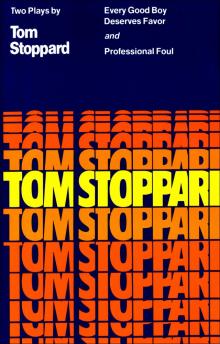 Every Good Boy Deserves Favor & Professional Foul
Every Good Boy Deserves Favor & Professional Foul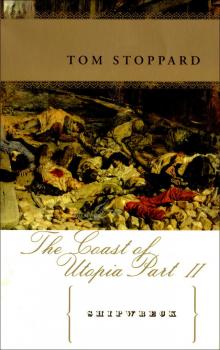 The Coast of Utopia: Voyage, Shipwreck, Salvage
The Coast of Utopia: Voyage, Shipwreck, Salvage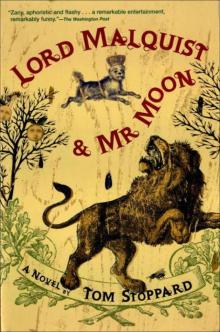 Lord Malquist & Mr. Moon
Lord Malquist & Mr. Moon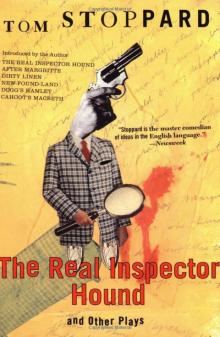 The Real Inspector Hound and Other Plays
The Real Inspector Hound and Other Plays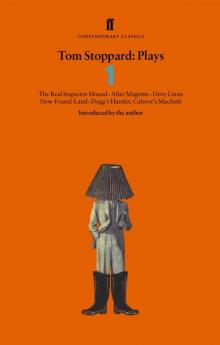 Tom Stoppard Plays 1
Tom Stoppard Plays 1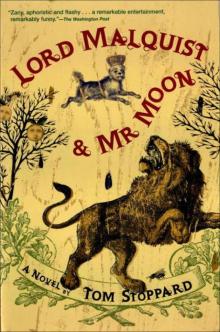 Lord Malquist & Mr. Moon: A Novel
Lord Malquist & Mr. Moon: A Novel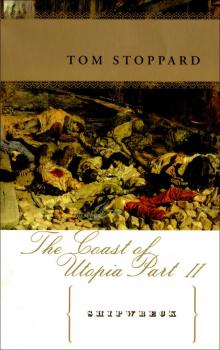 Shipwreck
Shipwreck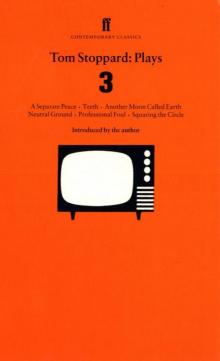 Tom Stoppard Plays 3
Tom Stoppard Plays 3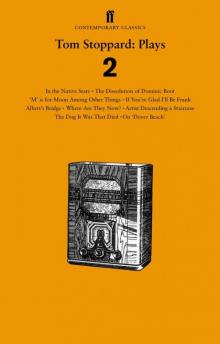 Tom Stoppard Plays 2
Tom Stoppard Plays 2 Rosencrantz and Guildenstern are dead. Arcadia
Rosencrantz and Guildenstern are dead. Arcadia